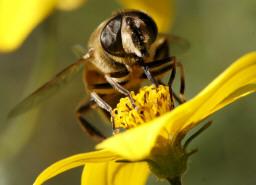Italian beekeepers sounded the alarm on Tuesday over a fresh wave of honeybee deaths, saying that the overuse of pesticides was mainly to blame.
The National Union of Italian Beekeepers (UNAAPI) said the latest disaster to hit the nation's honeybee population - which fell by almost half in 2007 - had coincided with the planting of maize crops and that 30-40% of hives were affected.
UNAAPI said that while drought and disease could also be factors in the mysterious die-off, the key suspect was insecticide.
The association revealed that Italy accounted for 33% of the total amount of insecticide used every year in the European Union while accounting for less than 10% of the land farmed in the bloc.
The UNAAPI and top Italian environmental association Legambiente launched a joint appeal for government action, calling for a ban on certain types of insecticides and constant monitoring of the situation.
They expressed renewed concern over a relatively new class of insecticides, so-called neonicotinoids, that are highly toxic to insects including bees at very low concentrations and are commonly used in seed treatments.
UNAAPI stressed that many beekeepers in the north of Italy had been forced to move their hives to mountain areas in order to save them from the harmful effects of neonicotinoids.
Legambiente Chairman Vittorio Cogliati Dezza said that ''beekeepers in Italy and the rest of Europe have been warning for years about the dangers associated with this new class of insecticides but nobody has listened.
''Bees are important environmental indicators. It is stupid and dangerous, for our health as well as the economy, to continue to ignore their death''.
It is estimated that some 200,000 beehives disappeared in Italy during 2007, causing a massive drop in honey output.
Similarly devastating declines in honeybee populations occurred in other European countries as well as the USA, with scientists coining a term for the phenomenon: ''Colony Collapse Disorder''.
Experts have expressed fear that without honeybees to pollinate crops, their loss could have an enormous horticultural and economic impact around the world.
Italy's leading farmers' union Coldiretti recently called on the government to revoke accords to test nine crops created with genetically modified organisms (GMOs) as part of a bid to save the native bee population.
Coldiretti argued, however, that GMO contamination and insecticide poisoning were ''not enough'' to explain the bee deaths.
A recent British study has implicated cellphone transmission waves while other scientists say climate change could be playing a role.
Coldiretti urged the government to order ''immediate testing of all possible risk factors''.
A third of all farming produce depends on insect pollination, it pointed out - 80% of which is carried out by bees.
If bees were to disappear it would have a ''drastic'' effect on Italy's 25-million-euro honey industry as well as ''wiping out'' most fruit crops including apples, pears, peaches, apricots, cherries, plums, melons, kiwi fruit and citrus fruit, it said.
The environmental effects of the current emergency could be ''disastrous'', Coldiretti said, quoting a purported warning from Albert Einstein:
''If the bee disappears off the surface of the Earth, Man Would have no more than four years to live''.
The Italian bee industry is worth 1.6 billion euros annually, with each hive generating about 1,240 euros.









